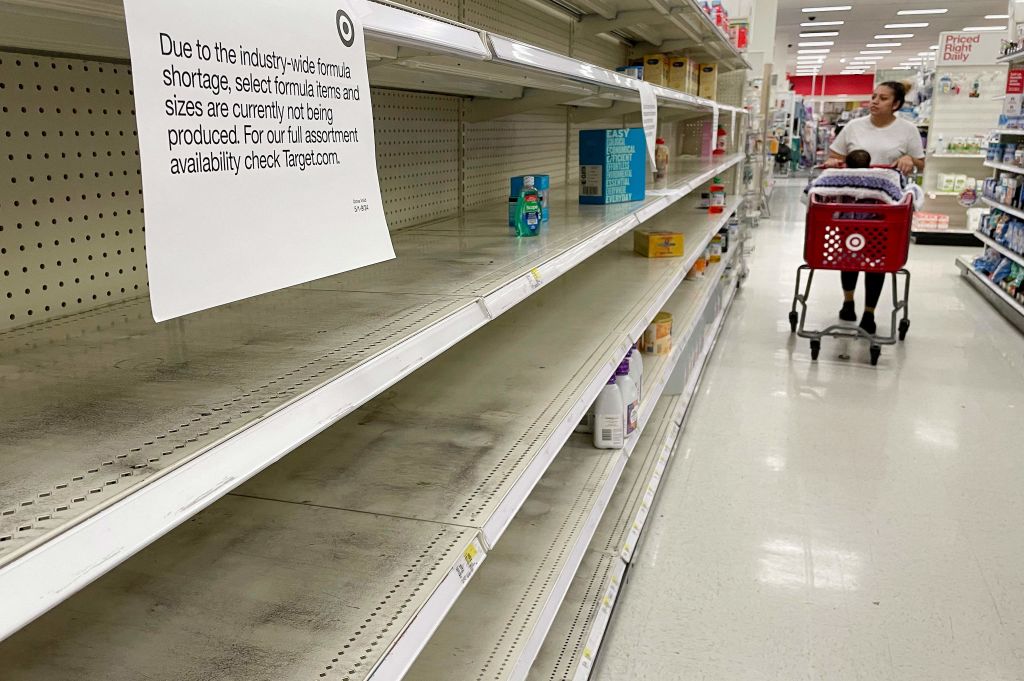
As parents across the country frantically search for baby formula amid a nationwide shortage, many have heard that the source of the problem is in Sturgis, Mich. That’s where Abbott, the multinational healthcare giant that sells formula under the Similac, Alimentum, and EleCare brands and controls 40% of the U.S. infant formula market, shut down its largest baby food plant in February after a type of bacteria linked to the hospitalization and death of several babies was found in the plant. (Abbott maintains there is not conclusive evidence its formulas harmed children.)
But the reason one plant shutting down has had such an outsized impact on the nation’s baby food supply can be traced to Washington, specifically decisions made in the 1980s in Congressional hallways and beleaguered bureaucratic agencies.
Like most issues in Washington, the baby food shortage is a multifaceted one, but it comes down to a simple mismatch between supply and demand. Millions of families use baby formula, and too few brands supply it, leading to catastrophic shortages when just one of the major brands has a lapse in production.
By six months of age, roughly three-quarters of babies born in the U.S. are given at least some formula, according to 2020 data from the Centers for Disease Control and Prevention. But lower-income moms are more likely than higher-earning ones to use formula over breastfeeding and start their babies on it earlier in life, due, in part, to the absence of national paid parental leave policies and less flexibility for mothers in service-industry jobs to breastfeed.
Read more: 5 Parents on the Stress of Feeding Their Babies Amid Formula Shortage
Many of those mothers end up taking part in the Special Supplemental Nutrition Program for Women, Infant, and Children, also known as WIC, which is run by the U.S. Department of Agriculture. Through state agencies, WIC gives families earning at or below 185% the federal poverty line vouchers and electronic cards to purchase baby formula on the government’s dime. In 1989, Congress, hoping to keep WIC’s costs down, passed legislation requiring states to use competitive bidding to select one manufacturer of infant formula to be covered by WIC.
Roughly half to two-thirds of formula purchased in the U.S. is bought through WIC, according to government estimates. With so many low-income parents relying on formula, the move by Congress led to the bid winners in each state dominating the formula market there. That spurred the kind of intense consolidation in the U.S. formula industry that has not been seen in many other parts of the world.
Since the single-contract rule was established more than 30 years ago, only three companies–Abbott, Gerber, and Mead Johnson—have received those WIC contracts. Their control over the market has disincentivized the creation of new brands, which is why the recent loss of Abbott’s products from store shelves has left many parents with few alternatives.
As of May 8, 43% of the top-selling infant formula products were out of stock across the country, according to software platform Datasembly, with the range of standard shortages falling between 2% and 8%.
“The extremely high levels of concentration in the infant formula market creates a serious risk to infant health if there is any disruption to a major manufacturer’s supply,” Senators Cory Booker of New Jersey, Amy Klobuchar of Minnesota, Tammy Duckworth of Illinois, and five other Democratic Senators wrote to Agriculture Secretary Tom Vilsack last week, calling for an “immediate antitrust review.”
“This is yet another example of how alarming levels of consolidation hurts American families and can no longer be ignored,” they added.
‘Infant formula is the most regulated food that exists’
In Michigan, mother Elyssa Schmier is among those flummoxed by the empty baby formula shelves at her local grocery stores. She had hoped to exclusively breastfeed her son, who is eight months old, but her body wasn’t producing enough milk—even when she woke up every three hours to pump. Her doctor advised her to supplement with formula, which now makes up approximately 60% of her son’s bottles when she can find it in stores.
Schmier, a vice president with MomsRising, which advocates for issues facing mothers and families, expressed frustration with seeing people use the moment to guilt moms for using formula when exclusively breastfeeding a child isn’t feasible for many, especially after they have begun tapering. “The best way to feed a child,” she says, “is to feed a child.”
In Washington, many of the proposed solutions to Schmier’s dilemma are focused on the immediate crisis.
The Biden Administration has urged states to temporarily loosen regulations around what brands and sizes of formula parents are able to purchase with WIC. A White House official told reporters on Monday that the Administration was also working with the four largest formula brands to identify hurdles to increasing supply domestically; the Administration also announced it would expedite the application and approval process for the importation of non-domestic formulas.

That process normally moves at a snail’s pace due to strict safety regulations governing baby formula. “Infant formula is the most regulated food that exists, by far,” says Dr. Steven A. Abrams, a professor at the Dell Medical School at the University of Texas at Austin and the chairman of the American Academy of Pediatrics’ Committee on Nutrition. “The reason being that if you leave a component out, the baby can have severe brain damage and die.”
But international brands are also disincentivized from exporting their baby formula to the U.S. by tariffs as high as 17.5%. Rep. Nancy Mace, a South Carolina Republican, is working on a bill that would temporarily waive such tariffs on baby formula products.
Rep. Abigail Spanberger, a Virginia Democrat, agrees that there needs to be some form of tariff reduction. “The fastest way to get more formula onto the shelves, at least in the short term, is going to be tariff relief,” she told TIME Monday.
Lawmakers from both sides of the aisle, including Sen. Marco Rubio, Republican of Florida, Sen. Kirsten Gillibrand, Democrat of New York, and Spanberger, have also urged the Biden Administration to consider invoking the Defense Production Act, a law originally passed amid the Korean War that gives presidents broad powers to control domestic industries during emergency situations. Both Biden and former President Donald Trump invoked the DPA to speed up production of supplies needed to combat the pandemic. “There is ample precedent for using the DPA to address a crisis in peacetime,” Rubio said in a statement last week.
But after the current crisis is over, and grocery stores are back to being fully stocked with formula, the underlying consolidation issue will remain, as well as the potential for similar shortages in the future. Addressing that problem would require a major overhaul of WIC, the kind that some experts who follow the issue are skeptical will happen any time soon.
“There’s still not an awareness that one of the government’s key roles is to structure markets, so that you don’t have fragile supply chains,” says Matt Stoller, the director of research at the American Economic Liberties Project, an antitrust advocacy group, and the author of Goliath: The Hundred Year War Between Monopoly Power and Democracy.
Spanberger says there also needs to be more transparency about possible shortages. She and a Republican colleague have drafted a bill that would require baby food manufacturers to inform the Food and Drug Administration (FDA) if they anticipate shortages moving forward, like manufacturers of other products do already. “There are certain requirements on various different types of industries that if they are anticipating supply chain disruptions or shortages, that they are to make that known to FDA,” she says, while acknowledging that the proposal wouldn’t solve the current shortages. “This legislation, unfortunately, won’t help us in the here and now,” she says.
In the more immediate future, Abbott announced on Monday that it had reached a deal with the FDA to resume operations at its plant in Sturgis as soon as within the next two weeks after the plant addresses safety concerns.
This won’t solve Schmier’s problems overnight, though. Abbott has previously said that once that plant was running again, it would take six to eight weeks for baby formula from there to return to store shelves.
—with reporting by Alana Semuels in New York
More Must-Reads from TIME
- Cybersecurity Experts Are Sounding the Alarm on DOGE
- Meet the 2025 Women of the Year
- The Harsh Truth About Disability Inclusion
- Why Do More Young Adults Have Cancer?
- Colman Domingo Leads With Radical Love
- How to Get Better at Doing Things Alone
- Michelle Zauner Stares Down the Darkness
Write to Abby Vesoulis at abby.vesoulis@time.com